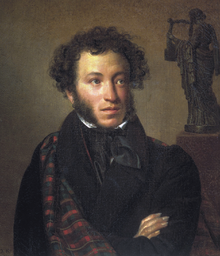Alexander Puschkin
| Alexander Pushkin | |
|---|---|

Alexander Pushkin by Orest Kiprensky
|
|
| Born | Aleksandr Sergeyevich Pushkin 26 May 1799 Moscow, Russian Empire |
| Died | 29 January 1837 (aged 37) Saint Petersburg, Russian Empire |
| Occupation | Poet, novelist, playwright |
| Language | Russian, French |
| Nationality | Russian |
| Alma mater | Tsarskoye Selo Lyceum |
| Period | Golden Age of Russian Poetry |
| Genre | Novel, novel in verse, poem, drama, short story, fairytale |
| Literary movement | Romanticism |
| Notable works | Eugene Onegin, The Captain's Daughter, Boris Godunov, Ruslan and Ludmila |
| Spouse | Natalia Pushkina (m. 1831) |
| Children | Maria, Alexander Fremke, Grigory, Natalia |
| Relatives | Sergei Lvovich Pushkin, Nadezhda Ossipovna Gannibal |
|
|
|
| Signature | |
Alexander Sergeyevich Pushkin (/ˈpʊʃkɪn/;Russian: Алекса́ндр Серге́евич Пу́шкин, tr. Aleksandr Sergeyevich Pushkin, IPA: [ɐlʲɪˈksandr sʲɪˈrɡʲejɪvʲɪtɕ ˈpuʂkʲɪn] (![]() listen); 6 June [O.S. 26 May] 1799 – 10 February [O.S. 29 January] 1837) was a Russian poet, playwright, and novelist of the Romantic era who is considered by many to be the greatest Russian poet and the founder of modern Russian literature.
listen); 6 June [O.S. 26 May] 1799 – 10 February [O.S. 29 January] 1837) was a Russian poet, playwright, and novelist of the Romantic era who is considered by many to be the greatest Russian poet and the founder of modern Russian literature.
Pushkin was born into Russian nobility in Moscow. Нis father, Sergey Lvovich Pushkin, belonged to Pushkin noble families. His matrilineal great-grandfather was Abram Petrovich Gannibal. He published his first poem at the age of fifteen and was widely recognized by the literary establishment by the time of his graduation from the Tsarskoye Selo Lyceum. Upon graduation from the Lycee Pushkin recited his controversial poem "Ode to Liberty" one of several that led to his being exiled by Tsar Alexander the First. While under the strict surveillance of the Tsar's political police and unable to publish, Pushkin wrote his most famous play, the drama Boris Godunov. His novel in verse, Eugene Onegin, was serialized between 1825 and 1832.
...
Wikipedia
